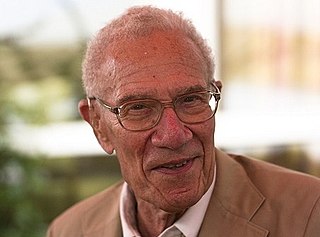Related Research Articles

William Spencer Vickrey was a Canadian-American professor of economics and Nobel Laureate. Vickrey was awarded the 1996 Nobel Memorial Prize in Economic Sciences with James Mirrlees for their research into the economic theory of incentives under asymmetric information, becoming the only Nobel laureate born in British Columbia.
An economist is a professional and practitioner in the social science discipline of economics.

Myron Samuel Scholes is a Canadian-American financial economist. Scholes is the Frank E. Buck Professor of Finance, Emeritus, at the Stanford Graduate School of Business, Nobel Laureate in Economic Sciences, and co-originator of the Black–Scholes options pricing model. Scholes is currently the chairman of the Board of Economic Advisers of Stamos Capital Partners. Previously he served as the chairman of Platinum Grove Asset Management and on the Dimensional Fund Advisors board of directors, American Century Mutual Fund board of directors and the Cutwater Advisory Board. He was a principal and limited partner at Long-Term Capital Management and a managing director at Salomon Brothers. Other positions Scholes held include the Edward Eagle Brown Professor of Finance at the University of Chicago, senior research fellow at the Hoover Institution, director of the Center for Research in Security Prices, and professor of finance at MIT's Sloan School of Management. Scholes earned his PhD at the University of Chicago.

Supply-side economics is a macroeconomic theory that postulates economic growth can be most effectively fostered by lowering taxes, decreasing regulation, and allowing free trade. According to supply-side economics, consumers will benefit from greater supplies of goods and services at lower prices, and employment will increase. Supply-side fiscal policies are designed to increase aggregate supply, as opposed to aggregate demand, thereby expanding output and employment while lowering prices. Such policies are of several general varieties:
- Investments in human capital, such as education, healthcare, and encouraging the transfer of technologies and business processes, to improve productivity. Encouraging globalized free trade via containerization is a major recent example.
- Tax reduction, to provide incentives to work, invest and take risks. Lowering income tax rates and eliminating or lowering tariffs are examples of such policies.
- Investments in new capital equipment and research and development (R&D), to further improve productivity. Allowing businesses to depreciate capital equipment more rapidly gives them an immediate financial incentive to invest in such equipment.
- Reduction in government regulations, to encourage business formation and expansion.

Robert Merton Solow, GCIH is an American economist whose work on the theory of economic growth culminated in the exogenous growth model named after him. He is currently Emeritus Institute Professor of Economics at the Massachusetts Institute of Technology, where he has been a professor since 1949. He was awarded the John Bates Clark Medal in 1961, the Nobel Memorial Prize in Economic Sciences in 1987, and the Presidential Medal of Freedom in 2014. Four of his PhD students, George Akerlof, Joseph Stiglitz, Peter Diamond and William Nordhaus later received Nobel Memorial Prizes in Economic Sciences in their own right.

The Jobs and Growth Tax Relief Reconciliation Act of 2003, was passed by the United States Congress on May 23, 2003 and signed into law by President George W. Bush on May 28, 2003. Nearly all of the cuts were set to expire after 2010.
A tax cut represents a decrease in the amount of money taken from taxpayers to go towards government revenue. Tax cuts decrease the revenue of the government and increase the disposable income of taxpayers. Tax cuts usually refer to reductions in the percentage of tax paid on income, goods and services. As they leave consumers with more disposable income, tax cuts are an example of an expansionary fiscal policy. Tax cuts also include reduction in tax in other ways, such as tax credit, deductions and loopholes.

Trickle-down economics is a term used in critical references to economic policies to say they disproportionately favor the upper end of the economic spectrum, i.e. wealthy investors and large corporations. In recent history, the term has been used broadly by critics of supply-side economics. Major US examples of what critics have called "trickle-down economics" include the Reagan tax cuts, the Bush tax cuts, and the Tax Cuts and Jobs Act of 2017. Major UK examples include the tax cut policies of Margaret Thatcher, the economic policies of Friedrich Hayek, and Liz Truss's mini-budget tax cuts of 2022. As of 2023, a number of studies have failed to demonstrate a link between reducing tax burdens on the upper end and economic growth.

Paul Michael Romer is an American economist and policy entrepreneur who is a University Professor in Economics at New York University. Romer is best known as the former Chief Economist of the World Bank and for co-receiving the 2018 Nobel Memorial Prize in Economic Sciences for his work in endogenous growth theory. He also coined the term "mathiness," which he describes as misuse of mathematics in economic research.

Stephen "Steve" Moore is an American conservative writer and television commentator on economic issues. He co-founded and served as president of the Club for Growth from 1999 to 2004. Moore is a former member of the Wall Street Journal editorial board. He worked at the Heritage Foundation during the period from 1983 to 1987 and again since 2014. Moore advised Herman Cain's 2012 presidential campaign and Donald Trump's 2016 presidential campaign.
The economic policy and legacy of the George W. Bush administration was characterized by significant income tax cuts in 2001 and 2003, the implementation of Medicare Part D in 2003, increased military spending for two wars, a housing bubble that contributed to the subprime mortgage crisis of 2007–2008, and the Great Recession that followed. Economic performance during the period was adversely affected by two recessions, in 2001 and 2007–2009.

Russell David "Russ" Roberts is an American economist. He is currently a research fellow at Stanford University's Hoover Institution and president of Shalem College in Jerusalem. He is known for communicating economic ideas in understandable terms as host of the EconTalk podcast.
The phrase Bush tax cuts refers to changes to the United States tax code passed originally during the presidency of George W. Bush and extended during the presidency of Barack Obama, through:

Lawrence Alan Kudlow is an American conservative broadcast news analyst, columnist, journalist, political commentator, talk radio host, and television personality. He is the chief financial program host for the Fox network who served as the Director of the National Economic Council during the Trump Administration from 2018 to 2021. He assumed that role after his previous employment as a CNBC television financial news host.

The American Recovery and Reinvestment Act of 2009 (ARRA), nicknamed the Recovery Act, was a stimulus package enacted by the 111th U.S. Congress and signed into law by President Barack Obama in February 2009. Developed in response to the Great Recession, the primary objective of this federal statute was to save existing jobs and create new ones as soon as possible. Other objectives were to provide temporary relief programs for those most affected by the recession and invest in infrastructure, education, health, and renewable energy.

Following the global financial crisis of 2007–2008, there was a worldwide resurgence of interest in Keynesian economics among prominent economists and policy makers. This included discussions and implementation of economic policies in accordance with the recommendations made by John Maynard Keynes in response to the Great Depression of the 1930s, most especially fiscal stimulus and expansionary monetary policy.

A carbon fee and dividend or climate income is a system to reduce greenhouse gas emissions and address climate change. The system imposes a carbon tax on the sale of fossil fuels, and then distributes the revenue of this tax over the entire population as a monthly income or regular payment.
Political debates about the United States federal budget discusses some of the more significant U.S. budgetary debates of the 21st century. These include the causes of debt increases, the impact of tax cuts, specific events such as the United States fiscal cliff, the effectiveness of stimulus, and the impact of the Great Recession, among others. The article explains how to analyze the U.S. budget as well as the competing economic schools of thought that support the budgetary positions of the major parties.
The Economists’ Statement on Carbon Dividends is a joint statement signed by over 3,500 U.S. economists promoting a carbon dividends framework for U.S. climate policy. The statement was organized by the Climate Leadership Council and originally published on January 16, 2019 in The Wall Street Journal with signatures from 45 Nobel Prize winning economists, former chairs of the Federal Reserve, former chairs of the CEA, and former secretaries of the Treasury Department.
On November 7 1990, an open letter to then President of the Soviet Union Mikhail Gorbachev was published and signed by a rank of thirty Western sources, most of whom were academics. The contents of the letter made the argument to the Soviet head of state that while moving the economy away from a centrally planned system towards a free market mixed economy was a step forward, they warned the leader against following through with the West had done following the end of feudalism; privatising the land itself, instead opting towards a Georgist system of common ownership and the collection of public revenue through land-value taxation. Nobel prize-winners Franco Modigliani, James Tobin, Robert Solow and William Vickery were among the letter's signees.
References
- ↑ "Economic Policy Institute. (February 10, 2003). Nobel Laureates, 450 Other Economists Fault Bush Tax Cut Plan Dividend Tax Cut Called "Misdirected."" (PDF). Retrieved 2007-10-31.
- ↑ Economist's Statement Opposing the Bush Tax Cuts-EPI-Retrieved 7 Jan 2010
- 1 2 "Statement's signatories". Archived from the original on 2007-06-16. Retrieved 2007-10-31.
- ↑ "Economists' statement opposing the Bush tax cuts" (PDF). Archived from the original (PDF) on 2007-09-28. Retrieved 2007-10-31.
- ↑ "Statement by economists supporting tax cuts" . Retrieved 2010-08-01.